The UMB Post[doc]
September 2020
Two Interesting Programs for Career Development During Your Postdoc
The Stress Doesn't End for Postdocs
What's the Value of YOUR Postdoc?
Ask an Expert: Jenn Aumiller - Concerns About Careers After COVID? There’s Hope!
SPOTLIGHT ON: The Founders of the Postdoc Advisory Committee
Rewiring My Brain Network to Network
September Career Development Events
Introduction
Dear Readers,
Hello! Thanks for sticking around with us.
Along with the official start of the Fall season, September also brings with it a chance to celebrate postdocs as a vital driving force in science and academia. This issue to dedicated to all postdoctoral fellows, both at UMB and all over the world.
Along with the different articles centered on postdoctoral experience and development, do check out the special events planned to celebrate the postdoctoral research community at UMB.
If you would like to participate in the making of this newsletter or contribute articles, do reach out to us at UMBPostdoc@som.umaryland.edu.
Thank you,
The UMB Post[doc]
Two Interesting Programs for Career Development During Your Postdoc
Long Jiang

You have probably heard about the Office of Postdoctoral Scholars (OPS), but you may not know there are so many different and interesting programs for the career development of postdocs offered. Here we will show you two programs which may give you some help during your postdoc training.
- Mentor Training for Postdocs Program: This program was launched by Jennifer Aumiller, Director of the Office of Postdoctoral Scholars and Director of the Graduate Program In Life Sciences/Office of Postdoctoral Scholars Career and Professional Development, in 2018. She was offering mentoring workshops for faculty at that time and realized that this would also be very beneficial for postdoctoral fellows for a couple of reasons:
- They are frequently very influential mentors for others in the lab.
- They are going to be future mentors, whether they go into academia or another field. This program gives a foundation for mindful mentoring. It is broken down into different areas that are outlined in the Entering Mentoring Program that was developed at the University of Wisconsin. It covers topics including maintaining effective communication, aligning expectations, assessing understanding, addressing equity and inclusion, fostering independence, and promoting professional development. The class structure is very communication-based, so attendees get to share their experiences and thoughts on mentoring in these areas. It also has case studies and small groups.
- Postdoc Strategy Program: The OPS decided to offer this series because they have seen some postdocs put too little thought and planning into different aspects of being a postdoc. Renee Cockerham, OPS Program Manager, says, “We began the series with talking about the timeline for a successful postdoc because we’ve seen some postdocs wait too long to think about their next career step and what they need to do to be ready for it”.
Thus far, OPS has offered one session for postdocs and over five sessions for faculty members. The feedback has been positive, including that it helped provide some new resources, as well as facilitated learning from each other.
OPS decided that the first series would include four different topics that had come up repeatedly over the years as they have worked with postdocs. This series happened every other week over lunch, and the sessions included:
- The timeline for a successful postdoc.
- How to get the most out of your mentoring relationships.
- How to effectively communicate your science.
- Navigating conflict in the workspace.
Dr. Julia Thayer finished her PhD at UMB in the lab of Dr. Marta Lipinski in the Department of Anesthesiology in the School of Medicine. She recently completed a short term as a postdoc in the lab to wrap up some experiments from her graduate work, which focused on the PARK10 gene, USP24, and its potential role in the autophagy pathway and in Parkinson’s disease. She has since moved on to a new postdoctoral fellowship at the National Institutes of Health. She attended the postdoc strategy session entitled “Timeline to a Successful Postdoc” in February 2020 because she wanted to get some guidance on what to expect each year of her postdoc, as well as what she should prioritize to make this training period effective for her transition to a more independent career.
“The program was very informative,” Julia said, “Having a map or outline of realistic goals when starting a fellowship position gives a great starting point for meaningful communication with new PIs/research advisors about expectations. The strategies I picked up from this session will continue to help me manage my timeline for experiments and professional development.”
Julia would definitely recommend attending this program as well as other career guiding seminars that the OPS offers. “The seminars are very informative, introduce you to a network of other postdoctoral fellows, and present the opportunity to receive feedback for questions and concerns,” Julia added.
OPS plans to offer these two programs again in the spring of 2021. They are open to expanding to new topics and would welcome any suggestions. If you have ideas, please contact Jennifer or Renee.
The Stress Doesn't End for Postdocs
Tramy Hoang
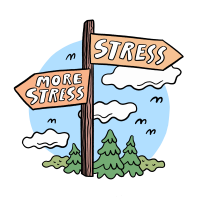
While mental health and stress in graduate school are often discussed and many schools offer tools and services to graduate students, the stress and anxiety do not end at graduation. For those continuing in academia as postdoctoral fellows (postdocs), the stress not only continues but, in various ways, can multiply. Many of the factors that plague graduate students also affect postdocs, including long hours, low salaries, the pressure to be “productive”, the grim outlook of the job market, etc. However, postdocs find themselves in a liminal state where they are no longer a student but not quite a faculty, the result being they enjoy the benefits of neither but experience the work and stress of both. So how does all this affect postdocs?
A study of two hundred postdocs found that 58 percent were considered languishing while 28.5 percent were depressed (based on self-reported parameters). In this study, languishing is defined as individuals who found life to be “unsatisfactory, unfulfilled, or stagnating” and depressed individuals reported clinically significant levels of depressive symptoms. Not surprisingly, the depressed group also reported the highest levels of stress, anxiety, and depressive symptoms. In comparison, about 7.1 percent of US adults have had one major depressive episode in the previous year. A number of studies have reported that these classifications correspond with how well a person can adapt to and recover from stressful events. They also reflect on a person’s interpersonal and organizational well-being. Positive emotions are associated with work engagement which, in turn, is correlated with “individual productive and organizational success.”
Studies investigating the stress and mental health of postdocs are rare. However, these types of data do exist for higher education in general. One study focusing on university faculty found that 66 percent experienced “severe” levels of stress at least half of the time. Another study on Flemish PhD students found that 51 percent experienced at least two common mental health problems, 40 percent experienced at least three, and 32 percent experienced at least four. These rates are significantly higher than the highly educated general population as well as highly educated students and employees. As for graduate students, about half have reported an emotional- or stress-related event in the last year. And graduate students have a higher suicide risk than undergraduate students, as well as compared to age- and gender-matched populations.
A lack of sleep is both a reason and a result of poor mental health. A survey of master’s, doctoral, and professional graduate students found that respondents were getting an average of 6.4 hours each night and only 62% reported good sleep quality. Furthermore, the study found that stress and exhaustion increased as sleep duration and quality decreased. This is a positive feedback loop where stress would lead to poor sleep which, in turn, could exacerbate already existing stress.
As previously mentioned, the data on the mental impact of working in academia on postdocs is almost non-existent, further highlighting the lack of recognition that postdocs receive. However, existing data indicate similarities in the shared experiences of postdocs with graduate students as well as junior faculty. Based on the present data, it is not difficult to see how experiences as postdocs can gravely affect mental health which can be linked to a person’s physical health.
As a postdoc, these findings are probably unsurprising. In fact, the data suggests you are highly likely to be experiencing some of this yourself. So, what is the solution? Several articles on the topic have laid out a multi-pronged approach:
- Institutions must provide resources that support post-docs during their training. These include providing health insurance, offering free access to counseling, as well as providing education on topics that will help improve the postdoc's training experience, these could range from career development to mental health sessions.
- Mentors should create an environment that fosters the growth of their mentees in a healthy way. Multiple studies have found that constructive supervisory support and encouragement as well as positive relationships with academic staff and peers can influence graduate student resilience. The data suggest that advisory relationship satisfaction is a “significant predictor” of depressive symptoms. Poor mental health and stress can negatively impact job performance and productivity. Therefore, it is in the best interest of the mentor and the lab to ensure that lab personnel are supported and not over-worked and over-stressed.
- Postdocs should be cognizant of their own mental health and know where and when to get help, as well as providing positive support to fellow postdocs (when possible). In addition, it is important for postdocs to build themselves a support network that may include fellow postdocs and graduate students as well as family and friends. And the support, itself can range from emotional to professional (mentoring, guidance), as well as practical (money, time, etc.). These support systems can help reduce stress and feelings of social isolation.
The UMB Postdoctoral Association (PDAC) and the UMB Office of Postdoctoral Scholars (OPS) are both important resources for postdocs and offer seminars and courses on many useful topics which should be taken advantage of.
The UMB Employee Assistance Program (EAP) is a free counseling and referral service available to employees and family members. They offer short-term counseling and can also make referrals when needed. Their website also provides resources and webinars on many topics.
What's the Value of YOUR Postdoc?
Archana Gopalakrishnan
As the month of September begins, several academic institutions across the nation begin to acknowledge and perhaps, appreciate, an essential working class of research scientists- the postdoctoral fellows (postdocs). For the last decade, the National Postdoctoral Association (NPA) has been celebrating National Postdoc Appreciation Week (NPAW). A week where postdocs in participating universities are made to feel that their presence in the academic world is valued! A week in a year…
As much as I, as a postdoc, appreciate the thought behind NPA’s initiative and continue to enjoy the month of September as the Office of Postdoctoral Services (OPS) at UMB organizes creative and novel events, the nagging question remains at the back of my head: What’s the value of a postdoc?
Let’s be honest: the academic job market is not what it was a decade or so ago. Being on tenure track, designing experiments in the comfort of your own lab was surely luring years ago. However, today, this nation generates far more research scientists than academia can handle. The burgeoning number of PhD and postdoc graduates are unable to find a footing in an academic institution even if they are passionate about research. Adding to this comes the critical issue of securing federal funding that has been steadily plateauing the last few years with an increasing number of junior faculty starting their own labs. Despite these odds, if a bright and young scientist can move ahead, they are still 10-15 years behind their peers in establishing their career.
All this brings me back to my pressing question: What’s the value of MY postdoc? As many young scientists who are shying away from academia, the prospect of furthering my career in academic research does not brighten my day. So, what take-home did my postdoc experience give me?
Anjali Mandlik, a Senior Medical Writer at PRECISION Scientia, says “Honestly…. I did my postdoc out of necessity; however, I do not regret the experience. It taught me the importance of collaborations, art of critical thinking and gave me a reality check of the sadly high stress environment of academic research”. This is a valued experience. A PhD student’s life is usually centered around classes, thesis proposals, and meeting with committees. The pressure of getting meaningful data that helps in completing a thesis story is usually so high that very few graduate students learn some of these essential soft skills. A postdoctoral fellowship seems to be the perfect place to not only take a pause and decide the direction to move, but also to gather valuable experience.
Piotr L. Pierog, head of Cell Product Clinical Translation at Takeda Oncology says that doing a postdoc is a MUST and valued by hiring managers (as long as postdocs are not working as glorified lab technicians). He believes that the type of knowledge gained along with the experience certainly counts. This aligns with what the GPILS/OPS Career Development Director, Jennifer Aumiller (UMSOM) has to say: “From speaking with hiring managers, yes - it does seem that a postdoc can give people a strategic advantage when looking for jobs outside academia. Of course, this depends on the career - but a postdoctoral fellowship is usually looked at as more experienced and moving towards independence. Some even state that in order to be considered for their positions, you need to have a postdoc.”
As outlined in this issue’s “Spotlight On...” article, three UMB postdoc alumni reflect on how being involved with extracurricular services outside the lab has shaped their professional development and helped one of them land their first job (outside of academia) after their postdoc. I realize that the last three years as a postdoctoral fellow gave me plenty of opportunities to enhance my professional development. I have been able to gain a better foothold in the world of science, be it reviewing manuscripts, teaching at Community Science labs, or being a freelance writer for the Postdoc newsletter. These are all experiences that are sure to have value in whatever path I chose ahead.
If there is a hint of indecisiveness in what career path a PhD graduate wishes to choose, then NOT doing a postdoc is SURE to close some doors in academia that might not be very easy to reopen. Jennifer advises: “If you aspire to be a teaching faculty at a PUI (Primarily Undergraduate Institution), or a faculty member at an academic institution - a postdoc is necessary to be the most competitive.” If you are one of those postdocs who feel undervalued, unsure of what these years toiling away in a lab would get you, use this time wisely. “Be sure to take advantage of career development opportunities and align yourself to be successful in the path that you choose. Network with others, see if you can learn more about the field that you are interested in by doing informational interviews, and go to career seminars,” Jennifer says.
People end up doing a postdoc for a variety of reasons: an easy transition from PhD, visa renewal issues, unsure of what to do next, or perhaps because this is the most logical step into establishing your own lab. Whatever the reason, let’s learn to start valuing it as an experience and gain expertise in transferrable skills that make us indispensable whether we wish to continue in academia or step away from the bench.
Ask an Expert: Jenn Aumiller
Concerns About Careers After COVID? There’s Hope!
Rebecca Walker
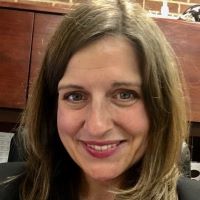
Since the UMB Postdoc Advisory Committee is celebrating National Postdoc Appreciation Week this month, in this issue we will be chatting with Jennifer Aumiller, Director of GPILS/OPS Office of Career Development, to get an idea of her aspirations and concerns regarding postdoc life.
Jennifer has spent the past seventeen years working to help graduate students and postdoctoral fellows with issues regarding career development. During this time she has been able to reflect on some of the common issues and concerns postdocs in particular face when thinking about career development. In this interview she also reflects about the brand new challenges researchers face with the curveball COVID-19 has thrown at fellows in this critical time in their career. She has a passion for taking the stress out of career development, seeing postdocs shine, and helping them to realize their potential.
A postdoctoral position often feels like a circus act; we often have many plates to spin and it can be tough to keep them all in the air at once. Whether it's building our CV, writing, reviewing and reading papers, doing lab work, or keeping things healthy at home, there’s often a lot on our plate. On top of that, 2020 has had a lot in store for us and everyone has had to adjust to a new way of balancing life. This has been stressful for many.
However, Jennifer expresses her concern about putting pressure on yourself during this complicated time, when everyone is trying to figure out how to do everything in a new way. “I think you also have to be gentle with yourself. As a parent, I’m balancing being a working parent and having my kids attend school virtually (all under the same roof!) Make sure to take some time for you – go for a walk, sleep like you normally would, walk away from the computer, try not to doomscroll.” Her message is one of hope and to cut ourselves some slack.
Jennifer notes that the most common issue that postdocs are concerned about is their next career step, what it should be, and how to get there, and she offers some words of advice about how to tackle this issue, even in times of our current pandemic. Jennifer’s reassuring message is “that you are not alone.” This stage feels especially stressful, but knowing that others are in the same boat can be comforting. She stresses the importance of community for realizing this kind of worry is common among us.
Although the Coronavirus pandemic has changed a lot about the interviewing and hiring process, she says “It has been interesting to hear from others about the impact, or the lack thereof, on their hiring practices.” It appears that many companies are still eager to hire, in fact, she states that “We have had federal agencies reaching out stating they are looking to hire now (we are scheduling a virtual day with the FDA (September 28th)) as well as some industry companies. I think maintaining and reaching out to networks can be very important during this time – it keeps us connected, and you can also hear about trends that are happening nationally.”
Another worry for many fellows is how to tackle the daunting task of career development. How do we move to the next step and what can we do to make it as simple as possible? Jennifer advises that “since the postdoc has a finite time in training, coming in with a plan and aiming early towards your goals is really important.” She says “taking the opportunity to step away from your lab and meet others in your field and beyond is very important to create a network.”
One of the most important things that will make a substantial difference to how a postdoctoral fellowship progresses is choosing a good mentor. This doesn’t have to be your PI, but it is so important to find someone who can help to guide you through your postdoctoral fellowship and out to the other side. Jennifer suggests that Postdocs “work very hard to create a mentoring network for yourself – outside of your PI. Many PIs are great mentors, but it is always nice to have a group to bounce ideas off of and to talk to about issues that you may be facing. Talk to others in your research field, have mentors that can talk to you about life transitions, career transitions, other areas.”
Jennifer says that having a community around you for support is very important during your postdoctoral research, and it will be so much more important now that we are physically further apart. “I have always strived to create community and opportunities for postdoctoral fellows. I think meeting other postdocs and getting connected while they are here to each other and to the robust research environment at UMB is very important.” So, having a good mentor and a good community is key to navigating the waterways of the postdoctoral career and keeping those plates spinning.
What’s great is that Jennifer and the team are always available in the postdoc career office to help out and offer advice. Jennifer says that she is “honored to get to work with postdocs every day – and I am so thankful for all of the things that they have done for the University of Maryland. Watching how much has grown for postdocs, by postdocs, during my time here has been nothing short of extraordinary. Thank you, thank you, thank you!” So, stop by [or email], thank her and the team for the work they do in supporting the postdoctoral fellow community and have a chat about your worries and concerns. They are sure to have some advice and information that will help you on your way.
SPOTLIGHT ON: The Founders of the Postdoc Advisory Committee
Archana Gopalakrishnan
Katie Leonard (KL) came to pursue her postdoctoral fellowship at UMB in 2012. She served as the Postdoc Advisory Committee President from 2015-2017 and stayed on as the treasurer from 2017-2018. Today, she is a Scientific Program Administrator for the American Association for Cancer Research (AACR).
Saumil Sethna (SS) joined the Department of Otorhinolaryngology-Head & Neck Surgery as a postdoctoral fellow in 2015 and has recently begun his appointment as a junior faculty in the same department. He served as the PDAC President/Co-President from 2017-2019.
Scott Baliban (SB) joined the Center for Vaccine Development (CVD) as a postdoctoral fellow in 2014 and is currently a Research Associate with CVD. He served as Vice President and then Co-President of PDAC from 2017-2019.

In 2013, Katie Leonard and Dr. Gemma Putts, two postdoctoral fellows were inspired by the accomplishments of the Graduate Student Council at UMB and the postdoc association at Johns Hopkins. They reached out to the Office of Postdoctoral Scholars in the hopes of creating a ‘community’ among postdocs. This was how PDAC came to be formed.
SB says: “I knew of many postdocs who toiled away in lab, feeling lonely or isolated from their peers. On top of this, there is almost a soul-crushing amount of uncertainty regarding what the future holds when you’re a postdoc—more so than what I expected when I was a grad student. I certainly didn’t have it all figured out. I wanted to change that or at least bring postdocs together somehow.”
SS recollects: “I joined UMB in March 2015 and for around 6 months or so, I did not know any postdoc outside my lab/Dept.”
Attending a joint social hour for postdocs from Hopkins and UMB gave him the opportunity to meet with Katie Leonard and other founding members of PDAC. Their discussions led to their realization that UMB postdocs needed representation. And so it began...
But we already had OPS representing us, why did we need another organization?
KL: “Postdoc representation encourages greater understanding of and response to the needs and concerns of postdocs. As members, one could also gain great administrative career development training that can be difficult to gain elsewhere.” Having an organization for postdocs led by postdocs also creates the sense of community that was missing.
SB: “When postdocs are at the helm of an organization like PDAC, they can be assured of being represented by their peers who share similar interests and goals.”
However, having an idea and beginning to realize it was very different.
The early days were rough and required a lot of brainstorming and grunt work.
SS: “We did not have a charter nor a budget, could not get a straight answer as to what the budget could look like, and no contact list for postdocs. So Katie manually made an email list of postdocs by searching available HR data. We went through a lot of uncertainty when establishing a crude version of PDAC.”
Adding to this was the fact that PDAC members had to also deal with the frustration of postdocs telling us they didn’t know who we were!
KL: “Biggest challenges with increasing the presence of the PDAC were buy-in from the postdocs, the budget, and communication. There was a lot of red tape and behind the scenes rules and regulations that we had to learn, especially when communicating to postdocs across the various schools at UMB.”
To get a sense of what activities would interest the postdoc community, PDAC went through a lot of trial and error.
SB: “Another challenge was having our scope limited by budgetary constraints. For PDAC to grow (and plan better events) so too must the annual budget.”
Today PDAC is supported by an annual budget from the Dean’s office, until then the PDAC founders had to find ways to raise money to organize events.
Despite these challenges, the PDAC sustained and its members worked hard and had rewarding experiences.
KL: “It took a little while for the PDAC to get a foothold but seeing the increasing presence of postdocs at events was very rewarding. I am especially proud of how well received the Postdoc Retreat days have been and personally I gained substantial information at these events that helped further my career. The weekly coffee hour breaks were also a favorite of mine. They helped me take much-needed breaks from the lab and even set up some good collaborations.”
SS: “The experiences have evolved over time with the evolution of PDAC. I saw the second Annual Retreat as the key turning point. We put all our efforts into that, and it turned out to be a roaring success with about 150 people coming for the keynote by Jorge Cham. That for me was the most satisfying day as President of PDAC – the culmination of months of efforts from a lot of people. Apart from that, I’ve made a lot of friends because of PDAC and can sincerely say that without PDAC, I would hardly know anyone on campus.”
SB: “I am very proud of PDAC’s metamorphosis. We really started from humble beginnings and every year we saw more and more positive change. The Annual Retreats have had almost every session packed with new and interesting speakers. The positive feedback we have received to date makes me believe our efforts have been worthwhile. My favorite events must be the joint social hours with Johns Hopkins and NIH (one of which had 100+ people) and the Annual Retreats.”
What can we envision in PDAC’s future?
KL: “I would love to see the PDAC have a stronger voice with the University administration so that when large scale decisions are made that affect postdocs, there are postdocs involved in the discussion. It would also be great to see more faculty engaged with the PDAC or at least encouraging their postdocs to be more well acquainted or involved with the PDAC and the services of the OPS.”
SB: “PDAC should strive to maintain a high level of interest and engagement of the postdocs at their monthly events and expand our postdoc community by organizing more joint events with Baltimore postdocs outside of UMB. In the coming years, I think it’s very important that PDAC continues to build on its relationship with University faculty and administration. As PDAC cements itself in the eyes of the University, it would be incredible if PDAC became a direct liaison between the university faculty and postdocs. This would increase postdocs’ power to effectively negotiate and may eventually take the form of a postdoc union contract.”
SS: “A joint and very ambitious goal of PDAC and OPS should be developing an internship program for postdocs (industry/non-profit) as the academic job market is very limited. This idea requires top-down buy-in and is much required in the current (and future) job market. PDAC should serve as better liaisons with faculty and upper management.”
A lot of volunteer work while balancing your research - being involved with PDAC can help you too.
KL: “PDAC specifically helped me learn the skills necessary for landing my current job. Despite taking me out of the lab at times, it did not compromise my research life. If anything, it gave me time to decompress from lab work and opportunities to discuss the problems I was having in a safe environment so that I was even more energized when I was in the lab. Having projects outside of the lab with my fellow postdocs also helped me feel more connected to the university, the city of Baltimore, and was an extremely rewarding experience. Plus, there’s usually free food or coffee!”
SB: “It was initially challenging to balance my plate with research and PDAC, but it became easier. Taking on leadership roles was really a great exercise in stepping outside of my comfort zone. Through my experience, I gained a lot of skills such as leading a team, managing a budget, handling competing priorities, learning to work with different personalities, and pushing boundaries respectfully. These have all come in handy in my current job and will undoubtedly help me in the future.”
SS: “I have always liked organizing events and hence PDAC was a natural extension of that. What I particularly found fruitful as President and Co-President was building a collective vision for PDAC and then executing the same. It’s a process that fundamentally teaches you many aspects of management and leadership. They do not come out on paper specifically, but I feel a difference of the many lessons learned. I don’t believe I had to comprise my research - it's all just time-management (another essential skill you can learn from PDAC). I would unreservedly encourage everyone to participate: So many things to learn and you get to know a lot of people!”
What are you waiting for? The foundation has been laid; the grunt work done. Years ago, UMB postdoc alumni created a legacy that serves to enrich your professional and personal wellbeing as a UMB research fellow. Get involved, be a part of PDAC and gain those soft skills that may not be acquired easily in your lab.
Rewiring My Brain Network to Network
Sridevi Ranganathan
.png)
After attending a few career development events, one starts to notice some common themes to people's independent journeys. Some have stood out to me. One, the route to the much-coveted position may sometimes be a little circuitous with some detours thrown in for good measure. Another one is that networking is critical in taking you where you want to go. If you sighed a little or rolled your eyes at the latter bit - hey there, welcome to the club!
Networking refers to the act of making informal connections with people with the overt intent of utilizing those relationships to understand or advance along a career path. Studies have shown that successful networking is positively correlated with the ability to get a job, higher salary, and growing in a career. However, you are not alone if you experience anxiety about networking - How do I start the conversation? Would this person be interested in talking to me? Will they think my questions are too naïve? How do I make an excellent first impression? What if I don't make a great first impression? How do I cope with this constant pressure to keep networking? How do I stay in touch with the people in my network? Depending on our personality types, many of us go through these anxieties at different magnitudes.
I am not incredibly shy or introverted, but neither am I fond of walking up to a person I barely know and initiating a conversation about their career path and how they got there. However, with all the emphasis on networking from people in positions that I aspire to be in, and armed with the collective knowledge from a million internet resources, I decided to make a conscious effort to work on my networking skills. To avoid repeating the tips and tricks by many other helpful resources (a few are listed at the end), I will discuss a few strategies that I have personally benefitted from.
If starting or holding a conversation intimidates you, practice on your home turf first. I started initiating conversations with people while waiting at the coffee shop in SMC or HSF- I have seen you around. Which department do you work in? What do you work on? Are you going to that event later today?
There is an obvious advantage to trying this- there is no expectation of any professional favor or advice here, so there is hardly any pressure weighing you down. If you make a great impression, it serves as a terrific confidence booster. If it is awkward, even more reason to hit the coffee stand often!
Career events and seminars can double up as your practice ground for translating the networking advice into action. I made some connections by striking up a conversation while waiting in the food line. Even if the first conversation revolved around reviewing local restaurants, it served as a good icebreaker. It made it a lot easier for me to contact the person later and initiate conversations about career and professional development. At large meetings or conferences, referring to something you heard a speaker or panelist say at an event is a great way to reach out and connect with them later.
I had to overcome my own inertia to network. I found it useful to set an achievable goal for every week. For instance, one week may be just shortlisting the people I think may help provide the information or advice that I am seeking. Another week's task may be to come up with a list of questions to ask the new contact during the conversation. This served two purposes: one, I felt prepared for the discussion, and two, the interviewee felt that their time was valued, ergo a great first impression!
For me, labeling an interaction as 'networking' transformed it into something bigger and scarier than it really is. I have readjusted the way I think about it now. If I were headed someplace but uncertain about the direction, I would stop and ask someone. Networking in its simplest form is just that- stopping and asking for directions to your next career destination. It may need some practice, but definitely worth putting in the work.
Networking tips and tricks- Here are some resources to get you started.
- If You Hate Networking - Career Network for Student Scientists and Postdocs at Yale
- Five Ways to Take the Dread Out of Networking Events - Forbes
- If You Dread Going to Networking Events, You Need to Read This - Andrew Griffiths Blog
- An Introvert's Guide to Conference Networking - Postdoc Experience Blog
September Events
Defining your Next Project on Paper: Small, Interactive Class | Wednesdays, 1-2 pm, 4 sessions: September 9th, 16th, 23rd, 30th (Register)
Leading a Successful Virtual Research Meeting or Event | September 10th, 9-10 am (Register)
Resiliency | September 14th, 9-10 am (Register)
Tips for Increasing Your Scientific Writing Productivity: Scientific Writing | September 17th, 9-10 am (Register)
Center for Advanced Imaging Research (CAIR) Imaging Science Seminar (Virtual) - Multimodal Optical Scope with Adaptive Imaging Correction (MOSAIC): From Single-Molecular Dynamics to Whole Organism Development | September 18th, 12-1 pm (Link Info)
Succeeding in Research During the Pandemic | September 22nd, 9-10 am (Register)
5th Annual Postdoctoral Virtual Retreat | September 21st - 25th (Watch your email for more information)
Bridges 2 Biotech: FDA Visit | September 29th, 9-11 am; 1-2:30 pm (Apply by Sept 16th)
NIH Basics: Understanding Grant Mechanisms, Funding Announcements, RePORTER | September 29th, 9-10 am (Register)
Developing your Research Question, Hypothesis & Specific Aims | October 8th, 9-10 am (Register)
Please check your inbox for emails with more information and registration links for these events
Postdoc Achievements
Awadhesh Arya
Muthukumar Gunasekaran, PhD
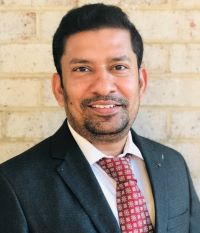
Muthukumar Gunasekaran, PhD, a research associate in the Department of Surgery, has received a prestigious Discovery Grant ($345,000) from the Maryland Stem Cell Research Fund to study “A novel Mechanism of immune evasion by human neonatal cardiac progenitor cells”. He is a research associate in the laboratory of Dr. Sunjay Kaushal, Professor of Surgery, Director of Pediatric and Adult Congenital Surgery. Dr. Gunasekaran’s studies focus on the therapeutic effects of neonatal cardiac derived mesenchymal stromal cells (nMSCs) in myocardial infarction (MI) and in identifying immune modulation and evasion potential of nMSCs by molecular signaling pathways, which are essential for cardiac repair and its clinical success. His studies in the future will contend that nMSCs will be utilized for therapeutic application or used as an adjunct to surgical intervention for patients with myocardial infarction to provide game-changing outcomes and thus change their life expectancy.
Megan Fox, PhD
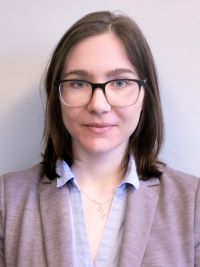
Megan Fox earned her PhD in Biological Chemistry from the University of North Carolina at Chapel Hill in 2016. Her graduate work focused on the dynamic regulation of monoamine neurotransmission in animal models of PTSD, depression, and opioid dependence. She served as a postdoctoral fellow in the laboratory of Dr. Mary Kay Lobo in the Department of Anatomy and Neurobiology, where she studied the molecular mechanisms up- and downstream of altered monoamine signaling. Dr. Fox’s early postdoctoral work was funded by a NIMH F32 award and focused on molecular mechanisms of dendritic remodeling in depression. She is a recipient of the NIDA K99/R00 Pathway to Independence Award for her current work that aims to uncover cell-type and circuit-specific molecular mechanisms in fentanyl use. As a postdoc, Dr. Fox has published research articles in Molecular Psychiatry, Biological Psychiatry, Addiction Biology, and Scientific Reports. She has received several awards, including the GPILS Postdoctoral Fellow Excellence in Research Award, and the American College of Neuropsychopharmacology (ACNP) Travel Award. She currently serves as a Co-Chair for the Gordon Research Seminar on the Neurobiology of Drug Addiction and was recently appointed as an Assistant Professor in the Department of Anatomy and Neurobiology.
Sara J. Codding, PhD
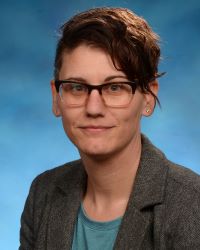
Dr. Sara J. Codding completed her PhD research at Oregon State University in Biochemistry and Biophysics in 2016. During her graduate work, she focused on elucidating the molecular role of the protein dysferlin as a calcium sensor for SNARE-mediated membrane trafficking and fusion. Her research provided new insight into the molecular mechanisms lost in late-onset muscular dystrophies that occur due to mutations in dysferlin. She is a fourth-year postdoctoral fellow in Dr. Matthew C. Trudeau’s lab in the Department of Physiology. Her current research focuses on imaging short-range intramolecular ion channel dynamics under voltage clamp using non-canonical amino acids and transition metal FRET. She was honored in February with the 2020 Paul F. Cranefield Postdoctoral Fellow Award by the Society of General Physiology (SGP) for her manuscript entitled: “The hERG potassium channel intrinsic ligand regulates N- and C-terminal interactions and channel closure,” published in the Journal of General Physiology. Dr. Codding was featured by SGP on their website and twitter @SGPweb. Her contributions to the Society continue as an ad hoc reviewer for the Journal of General Physiology. She was recently awarded a postdoctoral fellowship from NIGMS (2019-2020 F32). She is happy to announce that the Trudeau lab and herself just published an invited review (10.1080/19336950.2020.1816107) in the journal Channels that frame recent work on the intrinsic ligand with the current literature and highlights its divergent role in the gating and regulation of the ion channel family.
